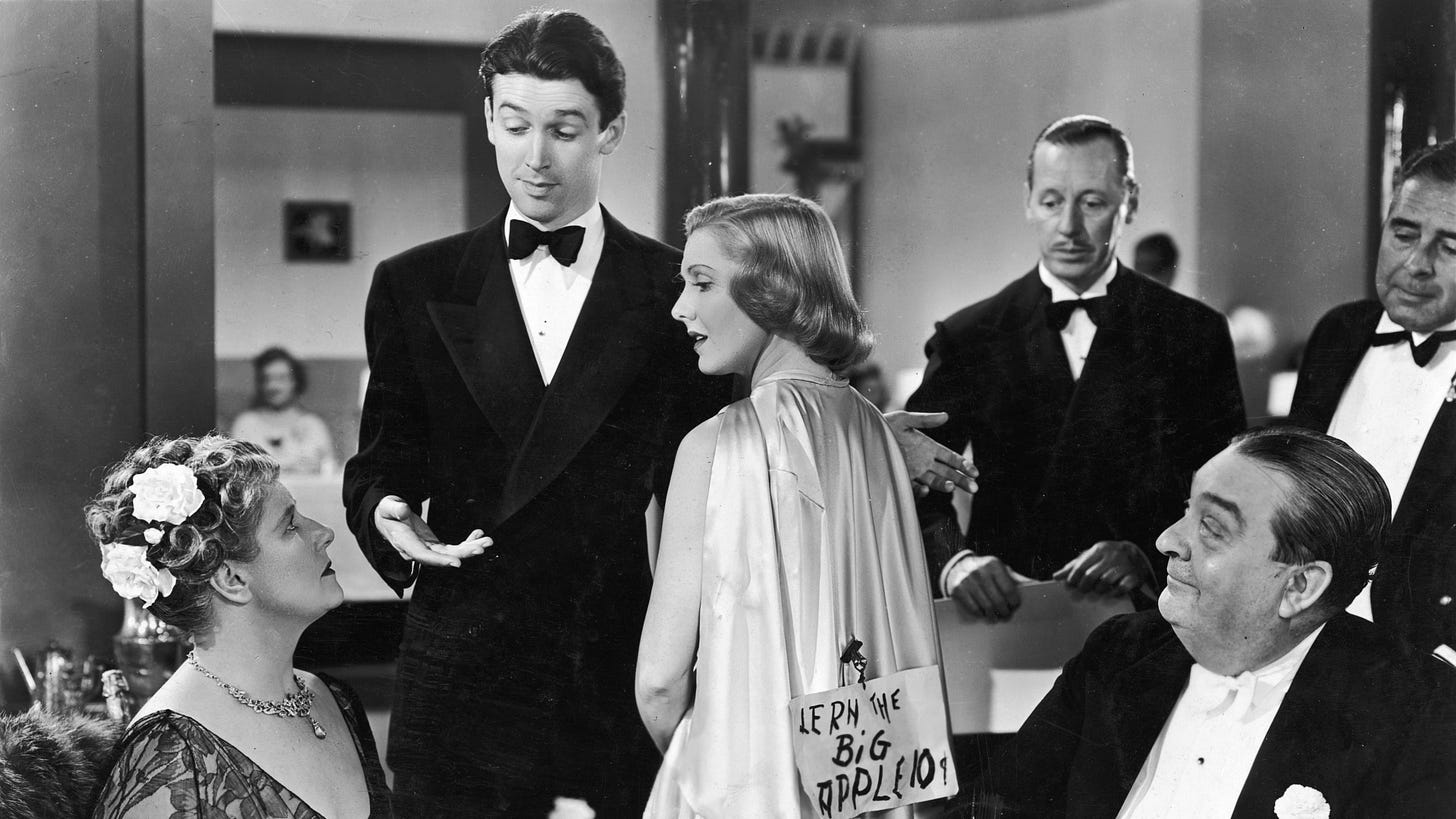Weekly Watches: June 26, 2024
Sharing Our Recent Discoveries: Weekly Watches with 100 Movies Every Catholic Should See
You Can’t Take it With You (1938)
Directed by Frank Capra
By
Frank Capra’s Best Picture-winning adaptation of Kaufman and Hart’s laugh-aloud stage play might not be as well-remembered as other Capra classics like It’s a Wonderful Life or Mr. Smith Goes to Washington, but it still stands as an ode to Capra as master of the American comedy for his day and age. Capra always had his finger firmly on the pulse of the American public, and gave them some of the most historically significant American comedy-dramas of the 30’s and 40’s. With You Can’t Take it With You, he tackles the age-old tug-of-war of money versus happiness, pitting the two firmly against each other, and naturally siding with happiness.
The story follows the relatively normal Alice Sycamore (an endearing Jean Arthur) and her deeply eccentric family, all living under the same roof and all pursuing various unusual hobbies with little regard for monetary success in their chosen interests, save Alice who works as a stenographer at the local bank. When Alice falls head-over-heels for the bank’s vice president Tony (the ever-reliable Jimmy Stewart), she must introduce her family to Tony’s straight-laced parents who have little patience for the Sycamore clan’s spontaneity and perceived lack of ambition. The clash of values between the two family patriarchs becomes the heart of the film, as Tony’s father (Edward Arnold) begins to see how his fixation on monetary success has caused estrangement between father and son. This is in sharp contrast to the Sycamore family’s welcoming home, and their open-heartedness slowly begins to soften the old banker’s heart.
The pressure to get carried away by the rat race is always with us, and the Sycamore family, foolish in the eyes of Tony’s parents, has a true family connection in a world that values external performance over real family love. Despite being seen as crazy, the Sycamores are the only sane people in the room because they’re joyful and real. There is no performance about their behavior. They know who they are and are embraced in all their eccentricities. Blessedly, this isn’t a modern “affirm me no matter what” kind of ideology. It’s a true unconditional love that encourages creativity and compassion, and destroys the delusion of “having it all together.” Climbing the ladder of financial success is the focus of many, but the only people who truly have it together are those who daily practice kindness and compassion towards their family.
The Outlaw Josey Wales (1976)
Directed by Clint Eastwood, starring Clint Eastwood
By
Once you've beaten your plowshare into a sword, will the other swords ever let you beat it back?
The Outlaw Josey Wales manages to do the "killer with a heart of gold" better than any other film I've seen. Clint Eastwood's performance in the title role is magnetic, and his imagery here ranks up there with the best westerns of all time. I literally paused on the first shot and called my wife in to see how gorgeous it was. Clint's got a real winner here, a bona fide classic Western long after the golden age and the spaghetti revival were over. We're not supposed to get a genuine American Western this gorgeous and this good in 1976, but Clint delivers.
The character of Josey Wales is one of the best examples of a complex protagonist done correctly that I think I've seen. The man seems to live by a code; we only ever see him shoot in self-defense or defense of others (although his time as a Confederate raider is helpfully elided, taking away some of his actions that might have been more unsavory). He has become a man of war, transformed into a cold-blooded killer by the evil actions of his enemy but recognizing that what he has become is not good, either. He is so consumed by anger that he refuses to give up his guns long after the fight is clearly lost. He is a man of war; as he says, "a part of all of us died in that damn war", and he thinks its the part that could redeem him, make him a man of peace again.
But as he travels, somewhat aimlessly but always ahead of his foes, he picks up people in need of protection. An old Indian who has been pushed further and further from his home and tradition; a young squaw outcast by her tribe after being raped; an old and young woman he saves from vicious comancheros. Although he has transformed himself into a man of war, these people see him rather as a guardian angel, and eventually he tries to allow himself to beat that sword into a plowshare again. But will his enemies allow him to do it? Is he cursed to always be the agent of destruction for the ones he holds dear? Or is some redemption through self-sacrifice available, even to one who has shed so much blood? These are the questions Josey Wales (and our actor-director Eastwood) wrestle with in this film, and I don't think I've ever seen it done more compellingly.
Content warning: two brief sex scenes with no nudity. The protagonist prevents two rapes in progress; one of these scenes includes nudity.
Bottle Shock (2008)
Directed by Randall Miller, starring Alan Rickman, Chris Pine, and Bill Pullman
By
There are very few tropes I like more than a classic underdog story. There is no country I love more than America. I wish I could say there is no beverage I enjoy more than wine, but unfortunately this would be a lie, but that is not to say I don’t enjoy a glass of Cabernet Sauvignon every now and then. Bottle Shock ended up being a delightful combination of these three loves of mine, telling the story of the 1976 wine competition in which California wineries overthrew the monopoly that the French winemakers had on the world of vineyards. While not a perfect film by any means, the comedy-drama delivers on a wine centered fight between America and France in a classic David and Goliath story.
I’d like to first get out of the way my problems with the movie, the first is its historical inaccuracy. Most of the real players involved in the story say that most of the script was made up. Yes, Chateau Montelena really made a Chardonnay that won in Paris, but most of how they got there (thus, most of the film) was fabricated for the sake of story. The only other issue I had with the film is Chris Pine’s hair (just look up pictures, you’ll understand). Now that that has been addressed, I’d like to state that the best part of the movie is Alan Rickman, as is often the case with films he is in. His performance as Steven Spurrier, the prim and proper wine snob, running around the dusty plains of California and being floored by the wines he finds there is hilarious and so well acted. The movie also captures the craft and dedication that winemakers put into their work, with beautiful shots of the Napa Valley area (as a Phoenix native, I have to say that it made me miss the desert). The story largely centers around Bo and Jim Barrett, a father and son duo who go through ups and downs in their relationship throughout the movie, but ultimately shows their love for each other and the passion a man has for his business, despite financial trouble. Overall, a charming and feel-good movie that is worth a watch with a bottle of your favorite vino.
Ikarie XB-1 (1963)
Directed by Jindřich Polák
By
Before Kubrick’s 2001 A Space Odyssey came Ikarie XB-1, a relatively obscure sci fi gem emerging from the Czech New Wave movement of the early 1960s. The visual similarity between the films is striking, with both featuring minimal and geometric spacecraft interiors contrasted vividly against the stark emptiness of space. There are some interesting shot-by-shot comparisons that are worth checking out. Kubrick is said to have screened the film for inspiration during 2001’s preproduction. This film provides a fascinating glimpse into what may have helped spark Kubrick’s imagination before the release of his seminal classic. Art does not exist in a vacuum.
With source material from renowned Polish sci fi author Stanisław Lem, Ikarie XB-1 presents an austere, yet psychologically nuanced look at deep space travel through the eyes of the crew members. Its as much a commentary on man living in society, albeit on a micro level, as it is a space exploration drama. The vivid colors and flying saucers of the film’s American contemporaries are replaced with a deep sense of introspection. Science fiction of the Eastern bloc tended to look inward to man’s soul rather than outward to technological progress as was often the case in the west. Andrei Tarkovsky’s Solaris, appearing a decade later, represented the culmination of this line of thought.
Despite its age, the film feels oddly contemporary. Perhaps its the clean black and white cinematography with fresh, geometrically minimal interiors and numerous hand held tracking shots that contribute to this overall sense. Lem’s focus on the drama of the human condition helps propel a slow burn, character driven narrative. Sure, there are some clunky dated moments, but overall, Ikarie XB-1 has to be one of the most unique looking films I’ve seen (not to mention the distinctive electronic fused sound design). In the end, as the cries of a newly born babe fill the space ship, we’re filled with a sense of hope and the triumph of the human spirit. While not exactly a knock-your-socks-off masterpiece, Ikarie XB-1 certainly represents a fascinating experience that anyone interested in film should check out.












An interesting fact about Stanislaw Lem is that he was a friend of Karol Wojtyla, also known as Pope St. John Paul II. Unfortunately, he was also an atheist. Let us pray for his soul in the hope of his salvation.
I have Catholic friends who say You Can't Take it with You is marxist propaganda